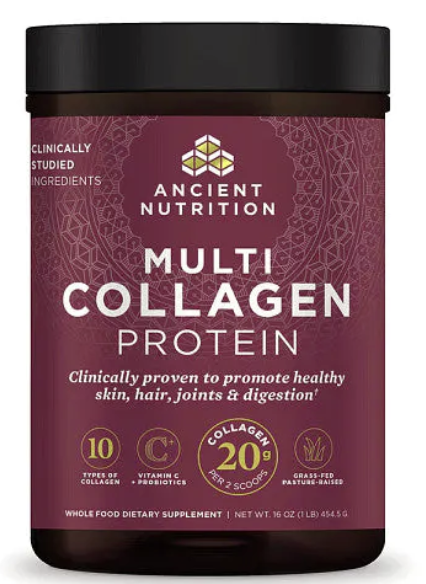Collagen and Lyme Disease
How are collagen and Lyme disease connected?
Collagen is the most abundant protein in our body and a major component of our skin, bones, muscles, and tendons. As we age, our body's collagen production decreases, leading to wrinkles, joint pain, and weakened bones. Collagen is also at risk when a person has a chronic illness such as Lyme Disease.
According to Dr. Rawls, there is a link between loss of collagen and Lyme disease. “Borrelia is possibly the most well known microbe with the ability to break down collagen. Not surprisingly, many of the symptoms of chronic Lyme disease occur at locations of high-density collagen: joints, ligaments, skin, eyes, gums, heart, and brain tissue. Inflammation and breakdown of collagen by microbes are likely the driving forces behind symptoms at these locations.”
While loss of collagen and Lyme disease go hand in hand, Rawls states that mycoplasma is the most studied illness in relation to loss of collagen.
Why does this happen? Dr. Rawls says in this article “In a scientific paper published in Infection and Immunity in 1996, researchers speculated why microbes might need to break down collagen, and proposed the following reasons:
To release amino acids for their growth
To break down natural tissue barriers to allow them to spread into deeper tissues
To create a protective environment in deeper tissues for growth of anaerobic microbes (bacteria that don’t use oxygen — examples include borrelia and mycoplasma)”
Fortunately, supplementing with collagen can help reverse these effects and provide many other health benefits. In this post, we'll explore the various types of collagen and the benefits of each one.
Click here to learn more about Dr. Rawls and his protocol.
Types of Collagen
Collagen comes in several types, each with a different structure and function in the body. The most common types are:
Type I: This type of collagen makes up 90% of our skin, hair, and nails and is essential for maintaining their strength and elasticity. Type I collagen also supports bone health by forming the mineral matrix that gives bones their strength and structure.
Type II: This type of collagen is found in our cartilage and is responsible for cushioning our joints and protecting them from wear and tear. Supplementing with type II collagen can reduce joint pain and stiffness, especially in people with osteoarthritis.
Type III: This type of collagen works with type I collagen to give our skin its firmness and elasticity. It's also found in our internal organs and blood vessels, where it provides structural support.
Type V: This type of collagen is important for the development of our cells, particularly in the placenta during pregnancy. It's also found in our hair and corneas.
Benefits of Collagen Supplementation
Skin Health: Taking a collagen supplement can help reduce wrinkles and fine lines, improve skin hydration and elasticity, and promote a more youthful appearance.
Joint Health: Supplementing with collagen can reduce joint pain, stiffness, and inflammation, particularly in people with osteoarthritis.
Bone Health: Collagen supplementation can increase bone density and strength, reducing the risk of fractures and osteoporosis.
Muscle Mass: Collagen is an important component of our muscles, and supplementing with it can improve muscle mass, strength, and function.
Gut Health: Collagen can help heal and seal the lining of the gut, reducing inflammation and improving digestion.
How to Supplement with Collagen
Collagen supplements come in various forms, including powders, capsules, and liquids. The most popular type is hydrolyzed collagen, which is broken down into smaller peptides that are easier for the body to absorb. When choosing a collagen supplement, make sure to look for one that contains the type of collagen you need and is sourced from high-quality, grass-fed animals.
In conclusion, adding a collagen supplement to your diet can provide many health benefits, including improved skin, joint, bone, muscle, and gut health. By choosing the right type of collagen and supplementing regularly, you can support your body's natural healing and aging processes and enjoy a more vibrant, youthful life.
Trusted Brands of Collagen
The Sana Life- Sana Life has created a collagen supplemented with 29 fruits, vegetables and herbs to take your health to the next level. Receive the benefits of collagen AND greens in one drink (and it tastes amazing!)
Ancient Nutrition Multi Collagen - Get 10 types and 20g of collagen, plus clinically studied ingredients like SBO probiotics and Vitamin C. This groundbreaking formula delivers real results you’ll see and feel. Available in powder or capsules.
Conclusion
In conclusion, adding a collagen supplement to your diet may offer a variety of benefits for overall health and wellness. Collagen is the most abundant protein in the body and plays a critical role in supporting healthy skin, joints, bones, and muscles. As we age, or fight off chronic illness, our body's natural production of collagen declines, which can contribute to wrinkles, joint pain, and other signs of aging. By supplementing with collagen, we can help support our body's natural collagen production and potentially improve these age-related concerns.
Furthermore, collagen supplements may also support gut health and improve skin elasticity. While more research is needed to fully understand the benefits of collagen supplementation, incorporating it into a healthy and balanced diet may be a simple and effective way to support overall health and wellness.
Collagen and Lyme Disease FAQ’s
What are collagen supplements? Collagen supplements are products that contain collagen, a protein that is naturally found in the body. They are typically available in powder, capsule, or liquid form and can be taken orally to help support skin, joint, and bone health.
What are the benefits of taking collagen supplements?
Collagen supplements have been shown to improve skin elasticity, reduce the appearance of wrinkles, and promote healthier hair and nails. They can also help support joint health by reducing inflammation and pain, as well as improve bone density.
Who can benefit from taking collagen supplements?
Collagen supplements can be beneficial for anyone looking to support their skin, joint, and bone health. This includes athletes, older adults, and individuals with chronic illness.
Are collagen supplements safe?
Collagen supplements are generally safe when taken as directed. However, individuals with allergies to certain food sources of collagen, such as beef or fish, should avoid collagen supplements derived from these sources. It's also important to choose high-quality products from reputable manufacturers to ensure purity and effectiveness.
How do I take collagen supplements?
Collagen supplements are typically taken orally, either in powder, capsule, or liquid form. The recommended dosage will depend on the specific product, so it's important to follow the manufacturer's instructions carefully. Collagen supplements can be taken with or without food, although taking them with food may help improve absorption.
How long does it take to see results from collagen supplements?
The time it takes to see results from collagen supplements can vary depending on the individual and the specific product. Some people may notice improvements in their skin, joint, and bone health within a few weeks of starting collagen supplements, while others may take longer to see results.
Are there any side effects of taking collagen supplements?
Collagen supplements are generally well-tolerated, but some people may experience mild digestive discomfort, such as bloating or constipation. These side effects are typically temporary and can be reduced by starting with a lower dose and gradually increasing over time.
Can collagen supplements be taken with other supplements or medications?
Collagen supplements are generally safe to take with other supplements or medications. However, it's important to talk to your healthcare provider before starting any new supplement or medication to ensure it won't interact with any existing conditions or treatments.


